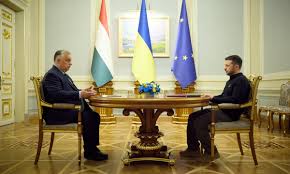Orbán’s stance on Ukraine pushes Hungary to brink in EU relations

Brussels: The posters are going up all over Hungary. “Let’s not allow them to decide for us,” runs the slogan alongside three classic villains of Hungarian government propaganda.
They are: Ukraine’s wartime leader, Volodymyr Zelenskyy; the European Commission’s president, Ursula von der Leyen; and Manfred Weber, the German politician who leads the centre-right European People’s party in the European parliament, which counts Hungary’s most potent opposition politician among its ranks.
That decision is Ukraine’s membership of the EU, a distant prospect not in the gift of any of the politicians now plastered across billboards in Hungary. Ballot papers, being sent out this week, ask a simple question: “Do you support Ukraine becoming a member of the EU?”
Despite the neutral question, Hungary’s government is not standing on the sidelines. After the launch of the campaign, the prime minister, Viktor Orbán, last week urged people to vote, claiming that Ukrainian membership would mean “we would have to spend all Hungary’s money on Ukraine”.
The government has also claimed – without offering evidence – that “cheap labour” from Ukraine would take jobs from Hungarians, while epidemics would spread because not enough Ukrainians get vaccinations.
The governing Fidesz party realised that “there is a sentiment against Hungary’s involvement in the war”, said László Andor, Hungary’s EU commissioner from 2010 to 2014. “But ever since, this has been used and abused to deny proper support to Ukraine.”
Hungary has repeatedly sought to block EU sanctions against Russia, eventually backing down. It has vetoed the release of €6bn funds to reimburse other EU countries providing military aid to Ukraine and flatly refused to sign two EU declarations in support of its invaded neighbour.
But now its attempts to stymie EU support for Ukraine could force a reckoning in its relations with the bloc at a moment when Orbán contends with his most serious political challenger in years.
EU member states are considering more seriously than ever how to use their ultimate sanction against Hungary: the removal of voting rights under the EU treaty’s article 7.
The idea remains at an early stage, but informed insiders think it will never happen because rescinding voting rights requires the unanimity of the remaining 26 members.
Under a previous government, Poland wielded the saviour veto; now Slovakia’s populist prime minister, Robert Fico, is seen as holding that card. The European parliament launched the article 7 procedure in 2018, but it has languished amid hesitancy among member states.
Now there are flickers of change. Andor said things had moved on since the Orbán government’s first “very consequential violations” against the independence of the judiciary emerged in 2010-11. “There are many more emotions [now]. Why? Because Orbán is obstructive on issues which the majority of the European Union countries consider of vital importance,” he said, referring to Ukraine.
Some think a reckoning will come if Hungary seeks to veto the extension of sanctions against Russia, a vast array of measures aimed at curtailing the war economy, including the freezing of €210bn of Russian central bank assets held in the bloc.
The profits are being used to fund Ukraine’s war effort, while the capital is seen as vital for its eventual reconstruction. But the measures need to be renewed unanimously by 31 July.
“I am pretty sure that if they felt they had the backing of the US, they would block,” said one senior EU official. “It would be huge: basically, it would put them not literally but virtually outside the union.”
Diplomats have taken comfort from the fact that Hungary has always backed down on threats to veto, possibly discouraged when Donald Trump also threatened Vladimir Putin with sanctions. “If the past is predictive for the future, we should be OK. But it would be foolish to assume that,” said one senior diplomat, who added that “work is going on” to find ways around a potential veto.
Dutch Green MEP Tineke Strik, who leads the European parliament’s work on Hungary and the rule of law, said: “Member states really are getting fed up with Orbán.” She counts 19 governments “that seem to be ready to take a step in the article 7 procedure”, which includes action that falls short of suspending voting rights. But they lack “a strategy on how to get the rest of the member states on board”, she added.
Last week, the Dutch MEP led a cross-party team of parliamentarians to investigate democratic standards in Hungary, concluding that developments were “going rapidly in the wrong direction”.
Pressure on independent voices is intensifying. In a speech last month, widely seen as marking a new low, Orbán described political opponents, journalists, judges and political activists as “bugs”, redolent of the dehumanising language used in Nazi Germany and the Soviet Union.
A report by the MEPs is expected to elaborate on Hungary’s deep-rooted problems: government-dominated media and politicised courts, as well as increasing restrictions on the LGBTQ+ community after the approval of a constitutional change to codify the ban on Pride marches and other public gatherings.
“Everyone is fearing this stands for something bigger – the free right to assembly,” Strik said.
For analysts, the Pride ban has a different purpose: to wrongfoot opposition leader Péter Magyar, the insider turned critic whose Tisza party has extended its lead on Fidesz since the start of the year.
“In strategic terms, [the Pride ban] is a trap set for Péter Magyar,” said Daniel Hegedüs, regional director for central Europe at the German Marshall fund.
If Magyar condemns the Pride ban, Fidesz will criticise him as part of the “European gay lobby”, which could alienate him from conservative voters, said Hegedüs, using the government’s own language. “But if he stays silent, he risks alienating the more educated, more urban voters for whom it’s a question of values commitment.”
In a similar way, the government is also seeking to use the Ukraine referendum to discredit Magyar among voters who are wary of Hungary being drawn into the conflict. His Tisza party is described by government propaganda as “pro-Ukrainian”, working with Brussels to “undermine the living standards of Hungarians”.
Tisza, Hegedüs said, is such “an existential threat” to Fidesz that Orbán could resort to electoral fraud to secure victory in parliamentary elections next year.
While the last three Hungarian parliamentary elections have been rated unfair – due to media and state resources tilted to favour the government – they have always been free.
“We cannot exclude the first neither free, nor fair election in an EU member state [and] a situation where the US administration will immediately recognise the outcome,” Hegedüs said.
This raises a challenge for EU diplomats, who have long argued the best way to solve the “Orbán problem” – like the “Poland problem” before it – is to wait for change at the ballot box.
Strik thinks it is the wrong approach. The Dutch MEP wants the commission to speak out more, seek a European court suspension order on the ban of LGBTQ+ events, and redistribute Hungary’s forfeited EU funds to civil society and local government: the Hungarian government lost €1bn in EU funds in 2024 over rule-of-law noncompliance, while a further €19bn is blocked.
“He [Orbán] should be under huge pressure from the EU to change his course,” said Strik.





